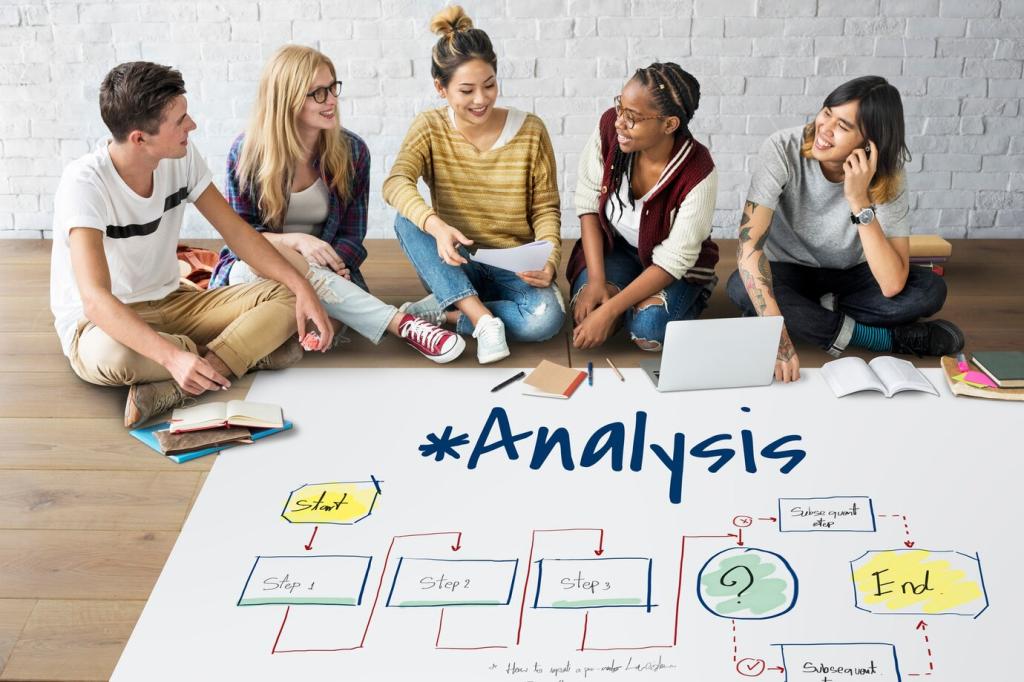Team-Building Exercises for Effective Collaboration in English
Team-building exercises play a pivotal role in fostering collaboration, trust, and communication within teams. When conducted in English, these activities not only strengthen teamwork but also enhance language skills among participants, particularly in diverse or international workplaces. Strategically designed exercises help break down barriers, encourage open dialogue, and provide opportunities for employees to engage in problem-solving and creative thinking together. This collaborative environment leads to better morale, increased productivity, and long-term team success. On this page, we explore a range of engaging team-building exercises that can be delivered in English, their unique benefits, and tips for effective implementation.
Icebreaker Activities for Comfortable Beginnings
Two Truths and a Lie
This classic icebreaker invites each participant to share three statements about themselves: two that are true and one that is a lie. The rest of the group guesses which statement is the lie. This task not only helps participants learn fun facts about each other but also stimulates conversation in English. It fosters careful listening and promotes detailed questioning, as team members try to uncover the truth. The activity helps break initial awkwardness and serves as an engaging starting point for deeper conversations, easing everyone into working together.
Human Bingo
In Human Bingo, participants receive bingo cards with various statements or characteristics (such as “has visited another continent” or “can speak more than two languages”). The objective is to find colleagues who match those statements and fill each spot on the card. This activity encourages direct interaction in English, making it a valuable tool for teams with members of different native languages. It accelerates bonding by highlighting shared experiences and sparking stories, laying the groundwork for future collaboration.
Who Am I?
The “Who Am I?” game attaches the name of a famous person or fictional character to each participant’s back or forehead. Others give hints, and the individual must guess their identity by asking yes-or-no questions. This fun activity energizes the group and encourages English dialogue in a playful context. It requires active listening and creative questioning, enabling participants to engage with each other’s personalities in a low-pressure environment. Such interactive games instill a sense of camaraderie that can endure long after the session.
The Telephone Game involves whispering a message down a line of participants, with the last person revealing how the message changed. This exercise highlights the importance of clear communication and careful listening. In an English-speaking environment, it emphasizes pronunciation, concise language use, and attention to detail. Beyond the laughter that ensues from message distortions, teams quickly realize how easily meaning can be lost and the value of explicit verbal exchange.

Trust Building for Stronger Bonds

The Trust Fall
The Trust Fall is a physical activity where one person falls backward, relying on teammates to catch them. This straightforward yet powerful exercise can seem intimidating, but it quickly demonstrates the importance of mutual reliance. It initiates honest discussions in English about comfort zones, boundaries, and support systems, reinforcing the idea that team members are there to support each other unconditionally.

Blindfold Navigation
In Blindfold Navigation activities, one participant is blindfolded while others guide them through a designated course using only verbal instructions. This game demands strong communication and absolute trust in colleagues’ guidance. Conducted in English, it also enhances language comprehension and precision. The blindfolded team member learns to trust their peers, while guides take responsibility for clear and empathetic communication, echoing professional scenarios where teams must navigate uncertainty together.

Partner Interviews
Partner Interviews pair team members to interview each other in English, aiming to uncover interesting aspects or unique talents. Afterward, each partner presents their findings to the larger group. This exercise deepens connections and fosters trust by encouraging disclosure and attentive listening. It helps uncover shared interests, promotes empathy, and strengthens bonds through personal storytelling, ultimately reinforcing a trusting and open team culture.
Problem-Solving Activities for Team Synergy
Escape Room Challenges
Escape Room Challenges involve teams working under time constraints to solve puzzles and achieve a common goal. All communication is conducted in English, fostering critical thinking, teamwork, and effective delegation. The urgency forces participants to quickly articulate ideas and listen actively, ensuring every voice is considered. These high-energy scenarios simulate real-world problem-solving and leave teams with a palpable sense of achievement.


Marshmallow Tower
Teams receive a set of materials—such as spaghetti, tape, and marshmallows—and must construct the tallest stable tower possible. This task spotlights collaboration, planning, and iterative design. In conducting this exercise in English, team members also practice giving clear instructions, sharing innovative ideas, and supporting experimentation. Debriefs often reveal valuable lessons about resilience, adaptability, and collective triumph in the face of challenges.
Virtual Team-Building for Remote Teams
Online Trivia Challenges
Virtual trivia games connect remote teams in friendly competition, requiring participants to answer questions on varied topics. All communication and responses are managed in English, making it an excellent way to practice language skills in real time. Trivia encourages knowledge sharing, healthy rivalry, and laughter—essential for team spirit. It also helps new members integrate smoothly and makes remote gatherings interactive and engaging.
Remote Team Storytelling
Remote Team Storytelling involves participants taking turns to add sentences or paragraphs to a story via video call or shared document. The activity encourages creativity, careful listening, and the use of English in an informal setting. As the story unfolds collaboratively, every team member has the opportunity to shape the narrative. It breaks the monotony of virtual meetings and helps create shared team memories, strengthening bonds across screens.
Virtual Coffee Breaks
Setting aside unstructured time for virtual coffee breaks lets colleagues chat informally in English about non-work topics. This open, social format mimics the spontaneous office conversations that foster connection and build rapport. Remote employees benefit from emotional support and stress relief, while leaders gain deeper insight into team dynamics. Regular virtual coffee breaks keep distributed teams feeling united and valued.
Group Reflection Circles
Group Reflection Circles invite team members to share their thoughts on recent projects or team-building exercises. Participants speak openly in English about successes, challenges, and lessons learned. This creates a respectful space for vulnerability and appreciation, encouraging continuous growth. As participants reflect together, they reinforce their shared commitment to collaboration and collective improvement.
Constructive Feedback Sessions
Facilitated feedback sessions help team members provide and receive targeted suggestions for improvement in a supportive environment. When conducted in English, these sessions improve both language proficiency and interpersonal skills. Emphasizing positive reinforcement and actionable advice, feedback sessions strengthen the team’s ability to learn from experience and drive better results in future collaborations.
Peer Recognition Moments
Including moments for team members to acknowledge each other’s contributions boosts morale and motivation. Peers can express gratitude and praise achievements in English, allowing non-native speakers to gain confidence in using positive language. Recognizing individual and group successes sustains momentum, enhances job satisfaction, and nurtures a culture where diligence and collaboration are consistently valued.
